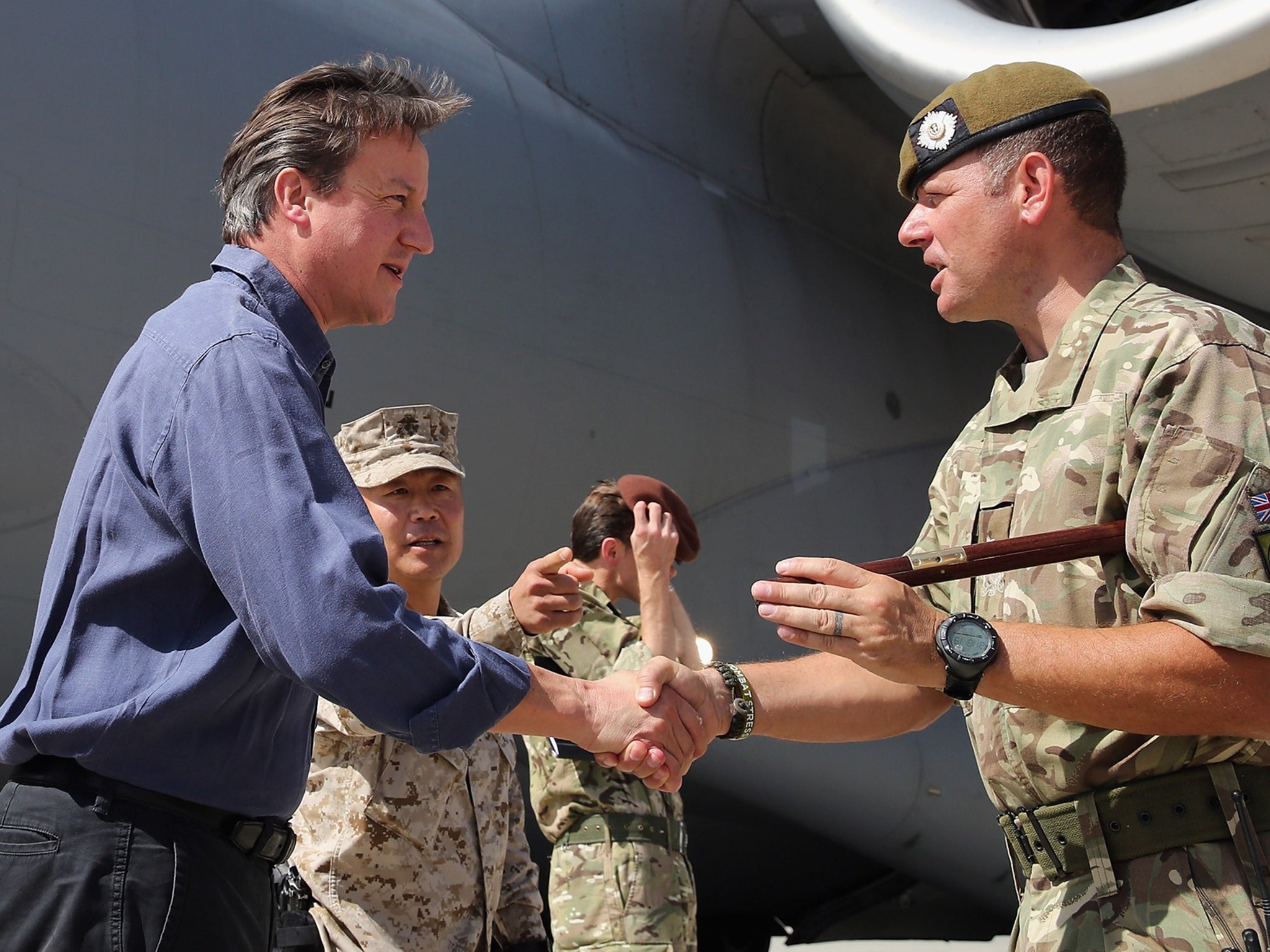High price paid by Britain in Afghanistan is worth it, says Cameron
On his final visit to UK troops, the PM praises their bravery and dedication

In the starkest terms of “blood and treasure”, Britain’s long and gruelling war in Afghanistan has cost far more than even Tony Blair could have imagined when signing the country up to the Coalition of the Willing in the wake of 9/11.
In the past 13 years, 453 British servicemen and women have lost their lives, while more than 600 have suffered life-changing injuries and thousands more have been wounded. The conflict has cost the UK more than £20bn.
Now, it is almost over. On Friday David Cameron paid his last visit to Afghanistan as a country in which British troops are fighting, and within weeks the last British combat forces will have left Afghan soil. His message was clear: we’ve done our part and now it’s up to you.
At Camp Bastion, the dismantling of the British base which was once home to nearly 10,000 troops is almost complete. In the words of one soldier: “We’re turning it back to the sand.”
While the airport and land will go back to the Afghans, everything that can be moved is returning to Britain. The camp is now a fraction of its former size and those still here can’t wait to get out. Addressing these remaining troops on a makeshift platform, Mr Cameron praised their bravery, dedication and courage. But he warned that while the mission in Afghanistan was ending, “the work will continue”.
“I’m afraid the work that you all do here will go on in other parts of the world,” he said. “Maybe not in the same way, but the fact is what we found here – Islamist extremist terrorism –that disease is still present in so many parts of the world.”
Earlier in the visit, Mr Cameron held bilateral talks with new Afghan President Ashraf Ghani and his defeated rival, Abdullah Abdullah, who is now the country’s first Chief Executive. He confirmed the UK troops would not return even if the security situation deteriorated.
In flawless English, President Ghani thanked the families of British soldiers who died in the conflict. He also pleaded with Britain not to shut itself off from Afghanistan – and said that the troops’ actions in his country had directly contributed to UK security.
“Remember what brought us together. It was through tragedy. 9/11 was followed by attacks on London. Your presence here means London has been safe, as has the rest of the world. We can’t be fortress Europe or fortress America.”
He added: “I thank your soldiers and civilians injured in Afghanistan and who have left parts of their limbs there. Some have haunting memories. But I hope they will remember the good heart of the Afghans.”
Mr Cameron announced that Britain is going to provide £178m a year in aid until 2017 to support health and education programmes. And next month, he will co-host a London conference to secure continued support from the international community for Afghanistan’s development.

During a press conference with the two leaders, the Prime Minister also suggested that Britain would accept the Taliban being brought into the new government if it renounced violence. “If the Taliban want to secure a role in the future of Afghanistan, then they must accept that they have to give up violence and engage in the political process,” he said.
Speaking ahead of the talks, Mr Cameron said he believed that despite its high price the mission had been both necessary and worthwhile.
“If you think in bald British terms, what we’ve been trying to achieve – to deny a safe haven to al-Qaeda and create a situation where the Afghans were capable of their own security without the presence of foreign troops – we have gone a long way to achieving that.”
He added: “This was the place where the 9/11 attacks were planned. This is the place where countless attacks were planned.
“When I became Prime Minister, nine out of 10 plots that we faced on the streets of Britain came from the Afghanistan/Pakistan area. That is now well down – somewhere below half are the latest figures I have seen, so I think that is a very real achievement.”
And he was confident that even without a significant US or British presence in the country, that could be maintained: “You’ve got a country that has gone from having had no army that now has a capable army – having had no police, now it has capable police.
“The core UK mission was about our own domestic security, and that required an Afghan army capable of taking care of Afghan security and denying a safe haven for al-Qaeda, and huge progress on that has been made.”
Asked about the lessons to be learnt from the conflict, Mr Cameron said it was clear that military measures alone would not be enough to defeat Islamic extremists.
“The lessons from Afghanistan are that in all these interventions you need to make sure you have a combined military, diplomatic, political and aid programme.
“That’s not always been perfectly aligned in Afghanistan, but I think you can see that now.”
Join our commenting forum
Join thought-provoking conversations, follow other Independent readers and see their replies
Comments
Bookmark popover
Removed from bookmarks